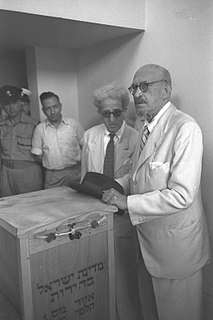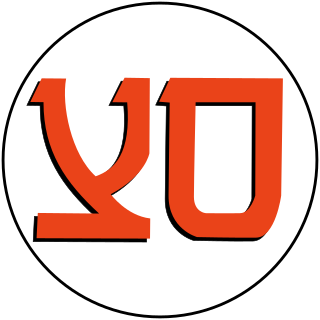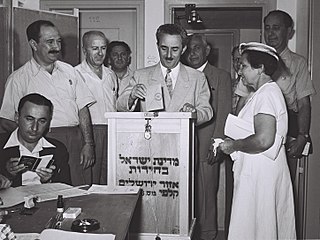| | |||||||||||||||||||||||||||||||||||||||||||||||||||||||||||||||||
| |||||||||||||||||||||||||||||||||||||||||||||||||||||||||||||||||
| Turnout | 81.57% | ||||||||||||||||||||||||||||||||||||||||||||||||||||||||||||||||
|---|---|---|---|---|---|---|---|---|---|---|---|---|---|---|---|---|---|---|---|---|---|---|---|---|---|---|---|---|---|---|---|---|---|---|---|---|---|---|---|---|---|---|---|---|---|---|---|---|---|---|---|---|---|---|---|---|---|---|---|---|---|---|---|---|---|
This lists parties that won seats. See the complete results below.
| |||||||||||||||||||||||||||||||||||||||||||||||||||||||||||||||||
Elections for the fifth Knesset were held in Israel on 15 August 1961. Voter turnout was 81.6%. [1]
| | |||||||||||||||||||||||||||||||||||||||||||||||||||||||||||||||||
| |||||||||||||||||||||||||||||||||||||||||||||||||||||||||||||||||
| Turnout | 81.57% | ||||||||||||||||||||||||||||||||||||||||||||||||||||||||||||||||
|---|---|---|---|---|---|---|---|---|---|---|---|---|---|---|---|---|---|---|---|---|---|---|---|---|---|---|---|---|---|---|---|---|---|---|---|---|---|---|---|---|---|---|---|---|---|---|---|---|---|---|---|---|---|---|---|---|---|---|---|---|---|---|---|---|---|
This lists parties that won seats. See the complete results below.
| |||||||||||||||||||||||||||||||||||||||||||||||||||||||||||||||||
Elections for the fifth Knesset were held in Israel on 15 August 1961. Voter turnout was 81.6%. [1]
The table below lists the parliamentary factions represented in the 4th Knesset.
 | |||||
|---|---|---|---|---|---|
| Party | Votes | % | Seats | +/– | |
| Mapai | 349,330 | 34.69 | 42 | −5 | |
| Herut | 138,599 | 13.76 | 17 | 0 | |
| Liberal Party | 137,255 | 13.63 | 17 | +3 | |
| National Religious Party | 98,786 | 9.81 | 12 | 0 | |
| Mapam | 75,654 | 7.51 | 9 | 0 | |
| Ahdut HaAvoda | 66,170 | 6.57 | 8 | +1 | |
| Maki | 42,111 | 4.18 | 5 | +2 | |
| Agudat Yisrael | 37,178 | 3.69 | 4 | 0 | |
| Poalei Agudat Yisrael | 19,428 | 1.93 | 2 | 0 | |
| Cooperation and Brotherhood | 19,342 | 1.92 | 2 | 0 | |
| Progress and Development | 16,034 | 1.59 | 2 | 0 | |
| Progress and Work | 3,561 | 0.35 | 0 | 0 | |
| Religious Sephardim List | 3,181 | 0.32 | 0 | New | |
| Supporters of Democracy | 335 | 0.03 | 0 | New | |
| Total | 1,006,964 | 100.00 | 120 | 0 | |
| Valid votes | 1,006,964 | 97.10 | |||
| Invalid/blank votes | 30,066 | 2.90 | |||
| Total votes | 1,037,030 | 100.00 | |||
| Registered voters/turnout | 1,271,285 | 81.57 | |||
| Source: IDI, Nohlen et al. | |||||
During the Knesset term, eight MKs broke away from Mapai to establish Rafi and two MKs left Maki to establish Rakah. Herut and the Liberal Party merged to form Gahal. Seven Liberal Party members unhappy with the decision (largely former Progressive Party members) broke away to form the Independent Liberals.
The fifth Knesset started with David Ben-Gurion's Mapai party forming the tenth government on 2 November 1961. His coalition included the National Religious Party, Ahdut HaAvoda, Agudat Israel Workers, Cooperation and Brotherhood and Progress and Development, and had 13 ministers. Kadish Luz of Mapai was appointed Knesset Speaker. The government collapsed when Ben-Gurion resigned on 16 June 1963 citing personal reasons, but in reality was annoyed at a perceived lack of support from his colleagues. He later broke away from Mapai with several colleagues to form Rafi.
Levi Eshkol took over Mapai and formed the eleventh government on 26 June 1963 with the same coalition partners as previously, but one more minister. The government resigned on 10 December 1964 when Ben-Gurion demanded that members of the Supreme Court investigate the Lavon Affair.
Eshkol formed the twelfth government a week later on 22 December 1964 with the same coalition partners and ministers as previously.
The fifth Knesset was notable for the coalescing of the two major right-wing parties (Herut and the Liberal Party) to form an electoral block (Gahal) capable of threatening Mapai's hegemony in Israeli politics. Gahal, which by then had become Likud, finally overtook Mapai (which had merged into the Alignment) in the 1977 elections.
Mapai was a democratic socialist political party in Israel, and was the dominant force in Israeli politics until its merger into the modern-day Israeli Labor Party in 1968. During Mapai's time in office, a wide range of progressive reforms were carried out, as characterised by the establishment of a welfare state, providing minimum income, security, and free access to housing subsidies and health and social services.

Herut was the major conservative nationalist political party in Israel from 1948 until its formal merger into Likud in 1988. It was an adherent of Revisionist Zionism.
Rafi was a center-left political party in Israel, founded by former Prime Minister, David Ben-Gurion in 1965. In 1968 it was one of three parties that merged to form the Israeli Labor Party.
The General Zionists were a centrist Zionist movement and a political party in Israel. The General Zionists supported the leadership of Chaim Weizmann and their views were largely colored by central European culture. Their political arm is one of the ancestors of the modern-day Likud.

Gahal was the main right-leaning political alliance in Israel, ranging from the centre-right to right-wing, from its founding in 1965 until the establishment of Likud in 1973. It was led by Menachem Begin.
The Progressive Party was a liberal political party in Israel.

Elections for the second Knesset were held in Israel on 30 July 1951. Voter turnout was 75.1%.

Sephardim and Oriental Communities was a political party in Israel and is one of the ancestors of the Likud party.

Elections for the third Knesset were held in Israel on 26 July 1955. Voter turnout was 82.8%.
Poalei Agudat Yisrael was a trade union and Jewish political party in Poland and a minor political party in Israel. It was also known as PAI or PAGI, its Hebrew acronym.

Mizrachi was a political party in Israel, and is one of the ancestors of the modern-day Jewish Home Party.

The Israeli Liberal Party, also known as the Liberal Party in Israel was a political party in Israel and one of the forerunners of the modern-day Likud. The party was created by a 1961 merger between the centrist Progressive Party and the General Zionists, forming a right-leaning, middle class-based party. The Progressives soon seceded to form the Independent Liberals in 1964.
Elections for the sixth Knesset were held in Israel on 2 November 1965. Voter turnout was 85.9%.

Pinchas Rosen was an Israeli statesman, and the country's first Minister of Justice, serving three times during 1948–51, 1952–56, and 1956–61. He was also leader of the Independent Liberals during the 1960s.
The Alignment is the name of two political alliances in Israel, both of which ended their existence by merging into the Israeli Labor Party.

The tenth government of Israel was formed on 2 November 1961 following the August elections. Although David Ben-Gurion was appointed Prime Minister, the government was actually formed by Minister of Finance, Levi Eshkol. On 7 September Ben-Gurion had told President Yitzhak Ben-Zvi that he was unable to form a government; on 14 September Ben-Zvi asked Eshkol to form a government, with Eshkol subsequently announcing that he would do so with Ben-Gurion as PM. It turned out to be the last government led by Ben-Gurion.

The eleventh government of Israel was formed on 26 June 1963, midway through the fifth Knesset. It was the first government formed by Levi Eshkol following the second resignation of David Ben-Gurion.

The twelfth government of Israel was formed by Levi Eshkol on 22 December 1964, towards the end of the fifth Knesset.

The thirteenth government of Israel was formed by Levi Eshkol on 12 January 1966, following the November 1965 elections. His coalition included the Alignment, the National Religious Party, Mapam, the Independent Liberals, Poalei Agudat Yisrael, Progress and Development and Cooperation and Brotherhood, and had eighteen ministers.